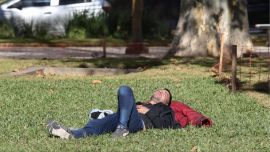Pope Francis on Tuesday opened his visit to Chile by asking forgiveness for child sexual abuse scandals that have rocked the Catholic Church in the South American country.
"I cannot begin to express the pain and shame that I feel over the irreparable harm caused to children on the part of Church ministers," the 81-year-old Argentine pontiff said.
"I would like to join with my brothers in the episcopate, because if it is right to ask for forgiveness and to support the victims with strength, we must at the same time commit ourselves to make sure that this does not happen again," he said.
Francis made his comments during a visit to President Michelle Bachelet's official La Moneda palace residence, drawing applause from pilgrims watching on giant screens in a Santiago park where he later celebrated an open-air Mass for some 400,000 people.
But the pope did not receive a universal welcome, with scuffles breaking out between riot police and demonstrators in the vicinity of O'Higgins Park.
Francis' visit – his first to Chile as pope – has been overshadowed by a report outlining the depth of sexual abuse in the local Church, and his appointment of a bishop who many here believe covered-up the country's most prominent sex abuse scandal.
The US-based NGO Bishop Accountability said ahead of the visit that almost 80 Roman Catholic clergy members had been accused of sexually abusing children in Chile since 2000.
Not far enough
For victims, the pope's request for forgiveness did not go far enough.
"We need concrete actions that the pope has not taken with the Chilean church," said Juan Carlos Claret, spokesman for a lay association in the southern city of Osorno.
Claret's group is demanding Francis remove Osorno bishop Juan Barros, who he appointed in 2015, despite Barros' ties to disgraced paedophile priest Fernando Karadima.
Karadima was accused of abusing children in 2010 and convicted by the Vatican to a life of penitence in 2011.
The pope was to address representatives of Chile's clergy later Tuesday at Santiago cathedral, before holding a meeting with the country's 50 or so bishops.
In his homily at the Mass, where the congregation included Mapuche women in traditional dress, Francis called for the rights and culture of indigenous people to be respected, so they could be treated as "a worthy child of this country.”
Earlier, he said in his speech to officials that indigenous peoples "can make a great contribution" to the environmental protection of the planet.
"We can learn from them that there is no true development in a population that turns its back on the earth and everyone and everything around it," he added.
However, there was no specific mention of the Mapuche community, with whom the pope is scheduled to meet Wednesday during a visit to Temuco, over 600 kilometres south of the capital Santiago.
Meanwhile, the pope also called for people to "listen" to migrants, whom he said "knock on the doors of this country in search of improvement, and in turn, with the strength and hope of wanting to build a better future for everyone.
Crowds have turned out to greet the pope, who will also visit Peru later this week, but the welcome has not been unanimous.
Attacks
Three Catholic Churches were vandalised on Tuesday, including one in the Araucania region, where most of the Mapuche people live.
In a sign of growing exasperation at Church inaction, activists from several countries meeting in Santiago on Monday launched a new global organisation, Ending Clerical Abuse (ECA).
The organisation "seeks to stop child sexual abuse by the clergy," said one of its founders, Jose Andres Murillo.
Victims of paedophile priests have campaigned for greater openness from the Church in dealing with offending priests, and Francis himself has declared a "zero tolerance" policy towards those who prey on children, something he is likely to reiterate in his speech to the clergy.
Message to Argentina
Francis sent his greetings to Argentina, as his plane flew over the country en route to Chile. The pontiff’s message said he was sending "my heartfelt best wishes to all the people in my homeland."
The papal flyby was yet another reminder that Francis has assiduously avoided returning to Argentina in his five years as pope and on his six trips to Latin America.
Most Vatican watchers attribute his reluctance to return home to his abhorrence of being used by Argentina's political factions, since any visit would involve a series of protocol visits, photo-ops and propaganda opportunities for whichever government is in power.
Francis is so attuned to the possibility that his image could be exploited for political ends that he refused while archbishop of Buenos Aires to offer communion at Mass to the rank-and-file, since it could be seen as an endorsement of the recipient.
- TIMES/AFP


























Comments